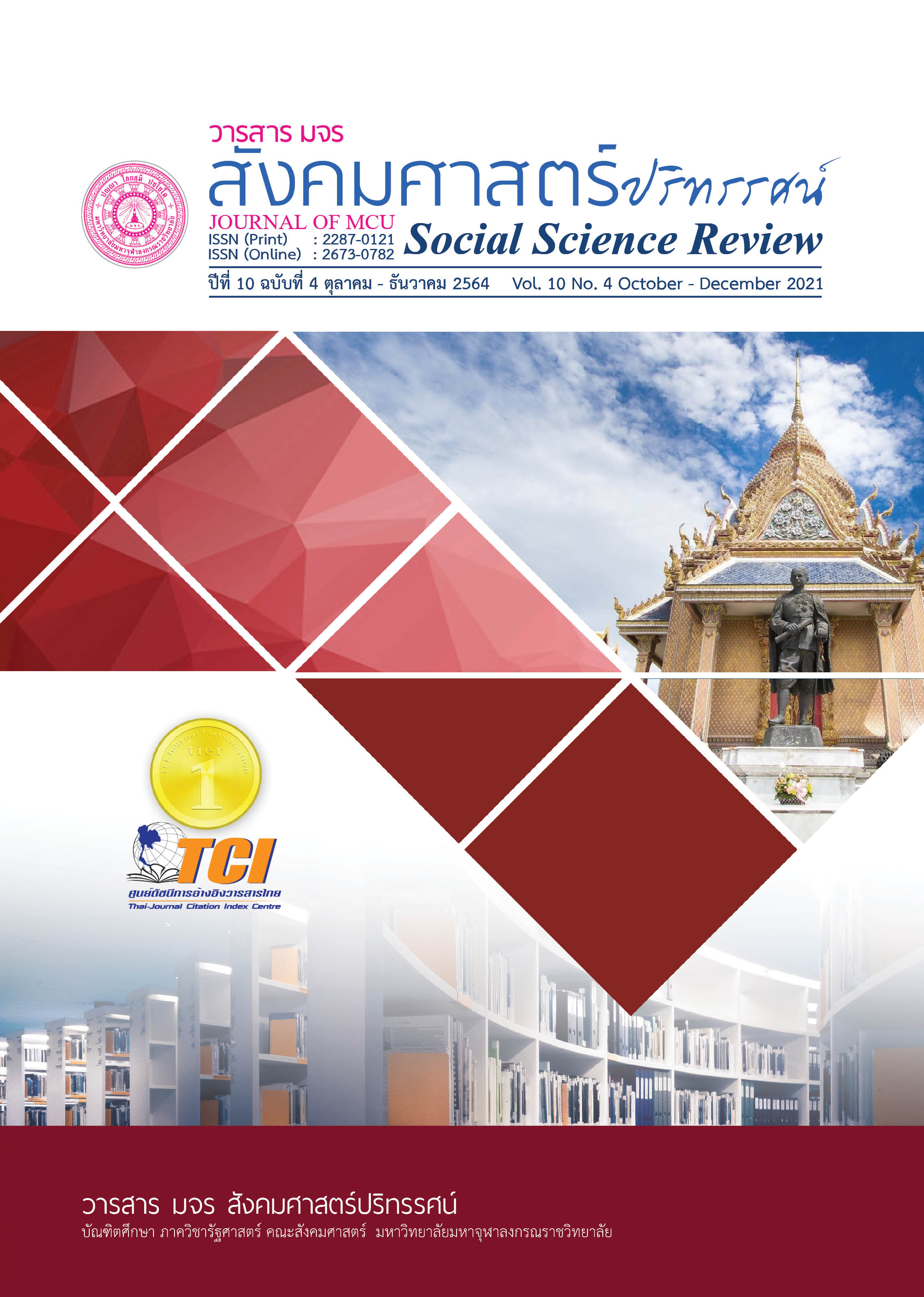ความต้องการจำเป็นในการบริหารจัดการวงดนตรีโรงเรียนระดับมัธยมศึกษา สังกัดสำนักงานเขตพื้นที่การศึกษามัธยมศึกษา เขต 2
คำสำคัญ:
ความต้องการจำเป็น, การบริหารจัดการ, วงดนตรีบทคัดย่อ
บทความวิจัยนี้มีวัตถุประสงค์เพื่อ 1) ศึกษาความต้องการจำเป็นในการบริหารจัดการวงดนตรีโรงเรียนระดับมัธยมศึกษา สังกัดสำนักงานเขตพื้นที่การศึกษามัธยมศึกษา เขต 2 2) ศึกษาแนวทางในการพัฒนาการบริหารจัดการวงดนตรีโรงเรียนระดับมัธยมศึกษา สังกัดสำนักงานเขตพื้นที่การศึกษามัธยมศึกษา เขต 2 ประชากรที่ใช้ คือ ครูผู้เกี่ยวข้องกับวงดนตรี จำนวน 90 คน เครื่องมือที่ใช้เป็นแบบมาตราส่วนประมาณค่า 5 ระดับ มีค่าความเชื่อมั่นของสภาพที่เป็นจริงเท่ากับ 0.899 และค่าความเชื่อมั่นสภาพที่คาดหวัง เท่ากับ 0.817 สถิติที่ใช้ในการวิเคราะห์ข้อมูล ได้แก่ ความถี่ ค่าเฉลี่ย ส่วนเบี่ยงเบนมาตรฐาน และการเรียงลำดับความต้องการจำเป็น
ผลการวิจัยพบว่า เมื่อวิเคราะห์และจัดอันดับความต้องการจำเป็นรายด้านพบว่า ด้านอุปกรณ์และอาคารสถานที่ มีค่าความต้องการจำเป็น (PNImodified) สูงที่สุด (0.60) เมื่อพิจารณาลำดับความต้องการจำเป็นรายข้อ พบว่า มีการสนับสนุนการระดมทุนเพื่อจัดหาเครื่องดนตรีที่มีคุณภาพ มีค่า PNImodified เท่ากับ 0.60 เป็นลำดับที่ 1 รองลงมา คือ ผู้บริหารมีส่วนร่วมในประชาสัมพันธ์การรับสมัครนักเรียนเข้าเป็นสมาชิกวงดนตรี ส่วนแนวทางในการบริหารจัดการวงดนตรี คือ มีคณะกรรมการจัดการวงดนตรีโดยเฉพาะ และการเพิ่มการมีส่วนร่วมของฝ่ายบริหารของโรงเรียนเพื่อให้ทางโรงเรียนเข้าใจปัญหาในการดำเนินงานทั้งในเรื่องงบประมาณ อุปกรณ์ สถานที่ และการประชาสัมพันธ์กิจกรรมของวงดนตรีให้กับนักเรียน ผู้ปกครอง ตลอดจนผู้สนใจภายนอกที่จะเข้าร่วมหรือสนับสนุนวงดนตรีต่อไป
เอกสารอ้างอิง
กระทรวงศึกษาธิการ. (2546). พระราชบัญญัติการศึกษาแห่งชาติ พ.ศ. 2542 และแก้ไขเพิ่มเติม (ฉบับที่ 2) พ.ศ. 2545. กรุงเทพฯ: โรงพิมพ์องค์การรับส่งสินค้าและพัสดุภัณฑ์.
________. (2553). แนวทางการจัดกิจกรรมพัฒนาผู้เรียน ตามหลักสูตรแกนกลางการศึกษาขั้นพื้นฐาน พุทธศักราช 2551 (พิมพ์ครั้งที่ 2). กรุงเทพฯ : โรงพิมพ์ชุมนุมสหกรณ์การเกษตรแห่งประเทศไทย จำกัด.
ลำเพย เย็นมนัส. (2553). ผู้บริหารสถานศึกษากับการบริหาร แบบมีส่วนร่วม ในยุคปฏิรูปการศึกษา. สืบค้น 17 พฤษภาคม 2564, จาก http://phrakhaoschool.com/news-detail_7962_57832
วิโรจน์ สารรัตนะ. (2546). การบริหารการศึกษา: หลักการ ทฤษฎี หน้าที่ ประเด็นและบทวิเคราะห์ (พิมพ์ครั้งที่ 4). กรุงเทพฯ: ทิพย์วิสุจน์
วิโรจน์ ตระการวิจิตร. (2559). สมองดี ดนตรีปั้นได้. กรุงเทพฯ: สำนักพิมพ์ ดีเอ็มจี.
สราวุธ โรจนศิริ. (2564). การศึกษารูปแบบการจัดการวงโยธวาทิต กรณีศึกษาโรงเรียนมัธยมศึกษาในเขตพื้นที่การศึกษาภาคตะวันออก. วารสารดนตรีรังสิต มหาวิทยาลัยรังสิต, 16(1), 115-129.
สวัสดิ์ บุญทิพย์พาเลิศ, (2557) โอกาสความเป็นไปได้ของการจัดตั้งวงโยธวาทิตสำหรับโรงเรียนในกลุ่มกรุงเทพกลาง. (วิทยานิพนธ์ปริญญาดุริยางคศาตรมหาบัณฑิต สาขาวิชาสังคีตวิจัยและพัฒนา) กรุงเทพฯ: มหาวิทยาลัยศิลปากร.
สาทิตย์ สายสนิท. (2560). การบริหารจัดการวงโยธวาทิตโรงเรียนจันทร์ประดิษฐารามวิทยาคมสังกัดสำนักงานเขตพื้นที่การศึกษามัธยมศึกษาเขต 1 (รายงานผลการวิจัย) กรุงเทพฯ: มหาวิทยาลัยราชภัฏบ้านสมเด็จเจ้าพระยา
อัครวัตร เชื่อมกลาง. (2561). แนวทางการพัฒนาวงโยธวาทิตไทยในศตวรรษที่ 21. วารสารวิชาการมนุษยศาสตร์และสังคมศาสตร์ มหาวิทยาลัยบูรพา, 27(55), 212-231.
Carver, J. (2019). An Investigation into the Musical and Social Benefits of High School Marching Band Participation. (Electronic Thesis or Dissertation). Retrieved from https://etd.ohiolink.edu/
ดาวน์โหลด
เผยแพร่แล้ว
รูปแบบการอ้างอิง
ฉบับ
ประเภทบทความ
สัญญาอนุญาต
ลิขสิทธิ์ (c) 2021 วารสาร มจร สังคมศาสตร์ปริทรรศน์

อนุญาตภายใต้เงื่อนไข Creative Commons Attribution-NonCommercial-NoDerivatives 4.0 International License.
เพื่อให้เป็นไปตามกฎหมายลิขสิทธิ์ ผู้นิพนธ์ทุกท่านต้องลงลายมือชื่อในแบบฟอร์มใบมอบลิขสิทธิ์บทความให้แก่วารสารฯ พร้อมกับบทความต้นฉบับที่ได้แก้ไขครั้งสุดท้าย นอกจากนี้ ผู้นิพนธ์ทุกท่านต้องยืนยันว่าบทความต้นฉบับที่ส่งมาตีพิมพ์นั้น ได้ส่งมาตีพิมพ์เฉพาะในวารสาร มจร สังคมศาสตร์ปริทรรศน์ เพียงแห่งเดียวเท่านั้น หากมีการใช้ภาพหรือตารางหรือเนื้อหาอื่นๆ ของผู้นิพนธ์อื่นที่ปรากฏในสิ่งตีพิมพ์อื่นมาแล้ว ผู้นิพนธ์ต้องขออนุญาตเจ้าของลิขสิทธิ์ก่อน พร้อมทั้งแสดงหนังสือที่ได้รับการยินยอมต่อบรรณาธิการ ก่อนที่บทความจะได้รับการตีพิมพ์ หากไม่เป็นไปตามข้อกำหนดเบื้องต้น ทางวารสารจะถอดบทความของท่านออกโดยไม่มีข้อยกเว้นใดๆ ทั้งสิ้น





